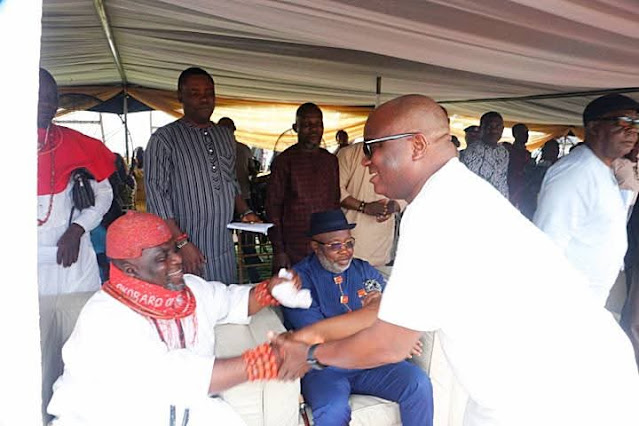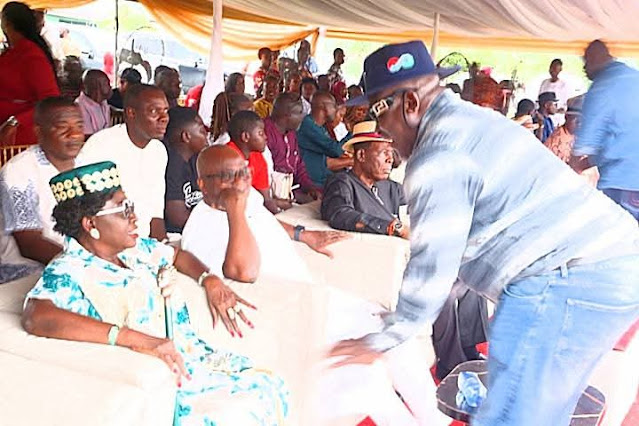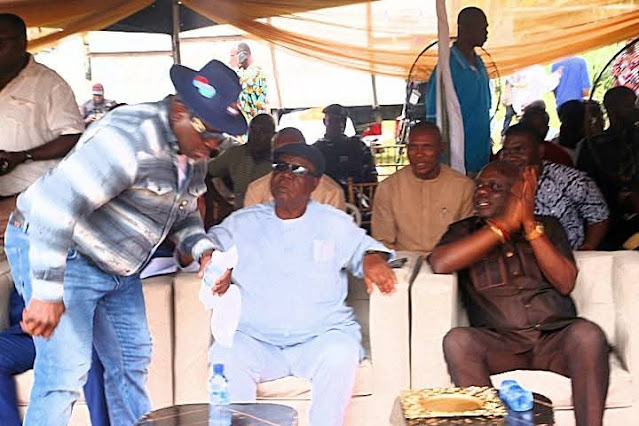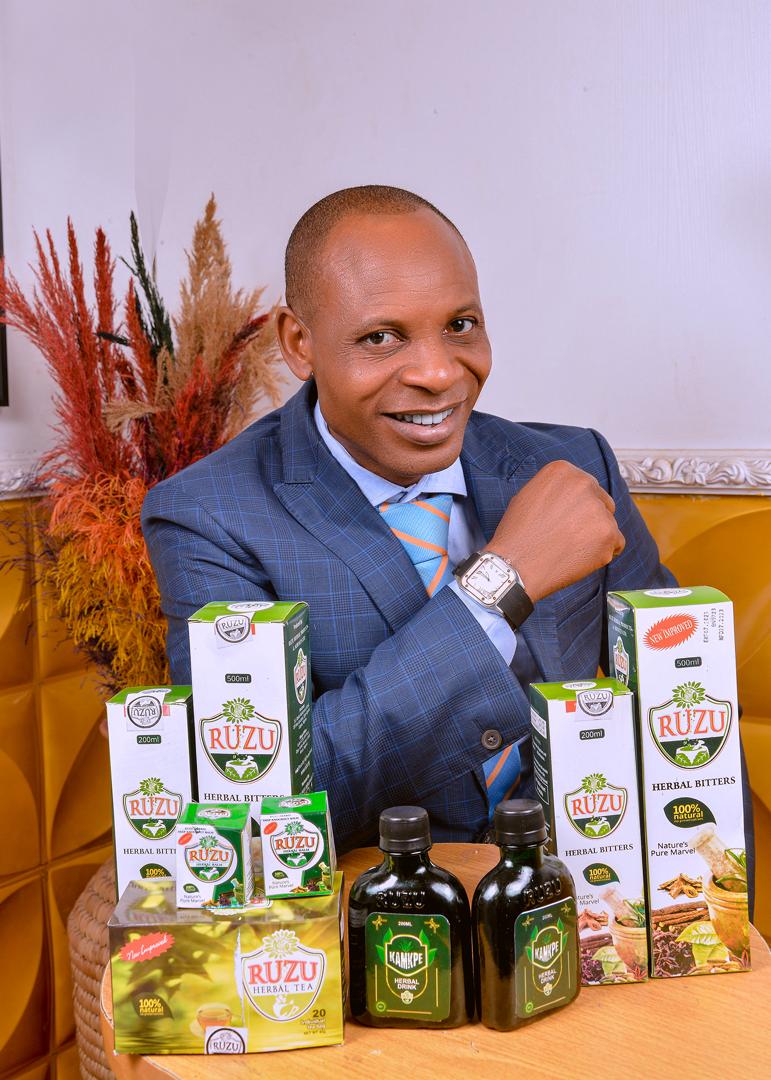In a powerful demonstration of his administration’s commitment to inclusive governance, Delta State Governor, Rt. Hon. Sheriff Oborevwori, has reaffirmed his dedication to ensuring that every community in the state benefits from the dividends of democracy. Speaking through his Chief of Staff, Hon. Johnson Erijo, at an empowerment event in Oginibo, Ughelli South Local Government Area, on August 23, 2025, the governor commended the State Commissioner for Works (Highways and Urban Roads), Comrade Reuben Izeze, for his impactful FOOSTODEY/Comrade Izeze Empowerment Scheme. The initiative, which provided financial support to 500 beneficiaries, including 300 women entrepreneurs and 200 elderly persons, underscores the state’s focus on uplifting vulnerable populations and fostering grassroots development. This landmark event not only highlights Izeze’s commitment to public service but also aligns with Oborevwori’s MORE Agenda, a comprehensive framework aimed at advancing the welfare and prosperity of Deltans.
The empowerment scheme, which disbursed funds to small-scale entrepreneurs and elderly individuals without family support, has been hailed as a model of grassroots empowerment. It reflects the broader vision of inclusive governance that Oborevwori has championed since assuming office, emphasizing unity, equity, and sustainable development. The event, attended by traditional rulers, political leaders, and community stakeholders, has sparked widespread discussion about the role of targeted empowerment in addressing poverty and fostering economic resilience in Delta State. This article explores the details of the empowerment scheme, its alignment with Oborevwori’s governance philosophy, the contributions of key stakeholders, and the broader implications for Delta State and Nigeria’s socio-economic landscape.
The Empowerment Event: A Celebration of Grassroots Development
The empowerment event in Oginibo was a vibrant showcase of Delta State’s commitment to uplifting its people. Held at a community venue in Ughelli South, the ceremony brought together a diverse array of beneficiaries, including traders, bakers, fruit sellers, food vendors, and elderly persons. The FOOSTODEY/Comrade Izeze Empowerment Scheme, spearheaded by Comrade Reuben Izeze, provided financial support to 300 women entrepreneurs and 200 elderly individuals, many of whom lack familial or social safety nets. The initiative aimed to empower these groups to achieve economic independence, improve their quality of life, and contribute to their communities.
Governor Oborevwori, represented by his Chief of Staff, Hon. Johnson Erijo, used the occasion to reaffirm his administration’s commitment to inclusive governance. He praised Izeze for his consistency in uplifting his constituents, describing the empowerment scheme as a reflection of the state’s broader mission to improve the welfare of Deltans. “Our administration is committed to ensuring that every community in Delta State benefits from the dividends of democracy,” Oborevwori said through Erijo. “Comrade Izeze’s initiative is a testament to the kind of leadership we need—leadership that prioritizes the needs of the people, especially the most vulnerable.”
The governor also singled out women for their steadfast support, noting their critical role in community development and political mobilization. “Women are the backbone of our communities, and their tireless efforts deserve recognition and support,” he said. “We will continue to sustain and expand programmes that empower women, youth, and the elderly, ensuring that no one is left behind.” This commitment aligns with Oborevwori’s MORE Agenda, which stands for Meaningful Development, Opportunities for All, Realistic Reforms, and Enhanced Peace and Security. The agenda serves as a blueprint for addressing Delta State’s socio-economic challenges, from poverty and unemployment to infrastructure deficits and security concerns.
Comrade Izeze’s Vision: Empowering the Vulnerable
At the heart of the event was Comrade Reuben Izeze, the State Commissioner for Works, whose passion for public service and grassroots empowerment has earned him widespread acclaim. In his remarks, Izeze articulated the motivation behind the FOOSTODEY/Comrade Izeze Empowerment Scheme, emphasizing that true leadership is measured by its impact on the lives of ordinary people. “Supporting our people, especially small-scale entrepreneurs and the elderly, is the true essence of leadership,” he said. “The essence of being a commissioner is not in big cars or buildings, but in the public good.”
Izeze’s initiative reflects his deep-rooted commitment to uplifting communities in Delta State, particularly in his native Ughievwen Kingdom. The empowerment scheme targeted two key groups: women entrepreneurs and elderly persons. The 300 women beneficiaries, who included traders, bakers, fruit sellers, and food vendors, received financial support to grow their businesses, enabling them to generate income, support their families, and contribute to the local economy. The 200 elderly beneficiaries, many of whom lack family support, were provided with funds to meet basic needs, such as healthcare, food, and shelter.
Izeze highlighted the transformative potential of empowering women, describing them as “tireless campaigners and faithful voters” who play a pivotal role in community development. “When you empower a woman, you empower a family, a community, and a nation,” he said. “These women are the heart of our markets and our homes, and their success lifts everyone around them.” By focusing on small-scale entrepreneurs, Izeze’s scheme addresses one of the most pressing challenges in Delta State: the lack of access to capital for micro-businesses, which form the backbone of the local economy.
The empowerment of elderly persons was equally significant. Many of the elderly beneficiaries are widowed or abandoned, with no reliable source of income or support. The financial assistance provided through the scheme offers them a lifeline, enabling them to live with dignity and security. Izeze’s focus on this often-overlooked group reflects his understanding of the social dynamics in Delta State, where traditional support systems for the elderly are increasingly strained due to urbanization and economic pressures.
Izeze also tied the empowerment scheme to Governor Oborevwori’s leadership style, symbolized by his traditional title, “Ukodo.” In Delta culture, Ukodo is a communal meal that brings people together, representing unity and shared prosperity. “This initiative reflects the inclusive leadership of Governor Oborevwori, whose Ukodo philosophy ensures that everyone has a seat at the table,” Izeze said. “We are contributing to the MORE Agenda by empowering women, youth, and the elderly, and we will continue to do so whenever the opportunity arises.”
The Selection Process: Ensuring Fairness and Transparency
The success of the FOOSTODEY/Comrade Izeze Empowerment Scheme was underpinned by a rigorous and transparent selection process, as outlined by Olorogun Stella Ogigba, the Chairman of the Planning Committee. In her welcome address, Ogigba revealed that over 4,000 applications were received for the scheme, reflecting the high demand for financial support among Deltans. A 14-member committee was tasked with screening the applications, ensuring that the selection process was fair, inclusive, and free from bias.
“We carefully reviewed every application to ensure that the most deserving candidates were selected,” Ogigba said. “Our goal was to identify individuals who would use this support as a seed for growth, inspiring others in their communities.” The committee’s meticulous approach resulted in the selection of 500 beneficiaries, with a focus on women entrepreneurs and elderly persons who demonstrated genuine need and potential for impact. The transparency of the process was widely praised, as it ensured that the funds reached those who needed them most, avoiding the pitfalls of favoritism or mismanagement that often plague empowerment initiatives.
Ogigba urged the beneficiaries to view the financial support as an opportunity for growth, not just for themselves but for their communities. “This is a seed that can grow into something much bigger,” she said. “Use it wisely, and let your success inspire others to strive for greatness.” Her remarks underscored the broader vision of the empowerment scheme, which seeks to create a ripple effect of economic and social progress across Delta State.
Symbolic Presentation and Community Impact
The highpoint of the ceremony was the symbolic presentation of dummy cheques to three beneficiaries: Mrs. Ejevwentotor Currency, Elohor Atori, and Mike Vivian. These individuals represented the diverse group of recipients, from small-scale traders to elderly persons seeking support for basic needs. The presentation was a moment of celebration, as beneficiaries expressed gratitude for the opportunity to improve their lives and contribute to their communities.
For women entrepreneurs like Mrs. Currency and Ms. Atori, the financial support provides a critical boost to their businesses. Many of these women operate in Delta State’s vibrant informal economy, selling goods in markets or running small-scale enterprises like bakeries and food vending. Access to capital is a major barrier for such entrepreneurs, who often rely on high-interest loans or personal savings to sustain their businesses. The empowerment scheme offers a lifeline, enabling them to expand their operations, hire additional help, or invest in new equipment.
For elderly beneficiaries like Mr. Vivian, the funds address immediate needs such as healthcare, food, and housing. In a region where social safety nets are limited, this support is transformative, allowing elderly individuals to live with dignity and security. The inclusion of elderly persons in the scheme reflects a broader commitment to social justice, ensuring that no segment of society is left behind in Delta State’s development journey.
The event’s impact extends beyond the immediate beneficiaries. By empowering 500 individuals, the scheme has the potential to benefit thousands of others indirectly, as recipients use their funds to support their families, employ others, or reinvest in their communities. This multiplier effect is a key feature of grassroots empowerment, as it fosters economic resilience and social cohesion at the local level.
Stakeholder Support and Broader Implications
The empowerment event was attended by a distinguished array of stakeholders, reflecting its significance to Delta State’s political and social fabric. Among the attendees were the 1st Vice Chairman of the Delta State Traditional Rulers Council and Pere of Akugbene-Mien Kingdom, HRM Pere S.P. Luke, Kalanama VIII; the Okobaro of Ughievwen Kingdom, HRM Dr. Matthew Ediri Egbi, Owahwa II; and Hon. Francis Waive, represented by Chief Bunor Agbomedarho. Other notable figures included Dr. Ebenezer Okorodudu, Executive Director of Projects at DESOPADEC; Chief John Oguma; Chief Patrick Fovie; and Chief (Mrs.) Roseline Amioku, Chairman of the Delta State Civil Service Commission.
These leaders lent their support to the initiative, reinforcing its alignment with Delta State’s broader development goals. Dr. Adogbeji Ideh, the Chairman of the occasion, lauded Izeze as a “vibrant politician” who genuinely cares for the grassroots. “Comrade Izeze’s commitment to empowering his people is an example for all leaders to follow,” Ideh said. “This initiative shows what is possible when we prioritize the needs of our communities.”
Other speakers, including Commissioner for Humanitarian Affairs, Community Support Services and Girl Child Development, Orode Uduaghan; Commissioner for Women Affairs and Community Development, Hon. Pat Ajudua; and Chairman of Ughelli South Local Government Council, Hon. Dr. Lucky Awreromre, echoed Ideh’s sentiments. They urged beneficiaries to invest the funds wisely, emphasizing the importance of sustainability and accountability. “This support is not a handout but an investment in your future,” Uduaghan said. “Use it to build something lasting for yourselves and your communities.”
The presence of traditional rulers and political leaders underscored the collaborative nature of the empowerment scheme. By bringing together government officials, traditional authorities, and community stakeholders, the event demonstrated the power of partnerships in addressing social and economic challenges. This collaborative approach aligns with Oborevwori’s Ukodo philosophy, which emphasizes unity and collective action as drivers of development.
The MORE Agenda: A Framework for Progress
The FOOSTODEY/Comrade Izeze Empowerment Scheme is a direct manifestation of Governor Oborevwori’s MORE Agenda, which serves as the cornerstone of his administration’s policies. Launched upon his assumption of office in 2023, the MORE Agenda outlines a vision for Delta State that prioritizes meaningful development, opportunities for all, realistic reforms, and enhanced peace and security. The agenda is built on the principle of inclusive governance, ensuring that every segment of society—regardless of gender, age, or socio-economic status—benefits from the state’s resources and opportunities.
The empowerment scheme aligns with several key pillars of the MORE Agenda. By providing financial support to women entrepreneurs, it promotes economic opportunities and gender equity, recognizing the critical role of women in driving economic growth. By including elderly persons, it addresses social welfare, ensuring that vulnerable populations are not marginalized. The scheme also contributes to peace and security by fostering economic resilience, as empowered individuals are less likely to engage in activities that destabilize communities.
Oborevwori’s emphasis on sustaining and expanding such programs reflects his commitment to long-term development. “We will continue to support initiatives that improve the welfare of Deltans,” he said through Erijo. “Our goal is to create a Delta State where every community thrives, and every individual has the opportunity to succeed.” This vision has resonated with Deltans, who see the MORE Agenda as a roadmap for addressing the state’s challenges, from unemployment and poverty to infrastructure deficits and social inequality.
The Broader Context: Empowerment in Nigeria
The FOOSTODEY/Comrade Izeze Empowerment Scheme is part of a broader trend of empowerment initiatives across Nigeria, as state governments and private organizations seek to address poverty and inequality. Nigeria, Africa’s most populous nation, faces significant socio-economic challenges, including high unemployment, limited access to capital, and a growing elderly population with inadequate social support. Empowerment programs, particularly those targeting women and vulnerable groups, have emerged as a critical tool for addressing these issues at the grassroots level.
In Delta State, the informal economy plays a vital role in sustaining livelihoods, with women dominating sectors like trading, food vending, and small-scale manufacturing. However, these entrepreneurs often face barriers such as lack of access to credit, inadequate training, and limited market opportunities. Initiatives like Izeze’s scheme address these challenges by providing direct financial support, enabling women to scale their businesses and achieve economic independence.
The focus on elderly persons is equally significant in a country where social safety nets are limited. Nigeria’s aging population is growing, and many elderly individuals, particularly in rural areas, lack access to pensions or family support. Empowerment programs that provide financial assistance to the elderly help bridge this gap, ensuring that they can meet basic needs and live with dignity.
The success of the FOOSTODEY/Comrade Izeze Empowerment Scheme offers lessons for other states and organizations in Nigeria. By prioritizing transparency, fairness, and community engagement, the scheme demonstrates how targeted interventions can achieve meaningful impact. It also highlights the importance of aligning grassroots initiatives with broader government policies, as seen in the synergy between Izeze’s scheme and Oborevwori’s MORE Agenda.
Challenges and Opportunities
While the empowerment scheme has been widely praised, it is not without challenges. The high number of applications—over 4,000—reflects the scale of need in Delta State, where poverty and unemployment remain persistent issues. Meeting this demand requires sustained funding, effective coordination, and ongoing monitoring to ensure that funds are used effectively. The selection process, while transparent, also underscores the difficulty of choosing a limited number of beneficiaries from a large pool of deserving candidates.
Another challenge is ensuring the sustainability of the empowerment scheme. While financial support provides immediate relief, long-term success depends on equipping beneficiaries with the skills, resources, and market access needed to sustain their businesses or livelihoods. Izeze and his team could consider complementing the scheme with training programs, mentorship, and access to microfinance, which would enhance its impact.
Despite these challenges, the scheme presents significant opportunities for Delta State. By empowering women and the elderly, it contributes to economic growth, social stability, and community resilience. The initiative also strengthens the bond between the government and its people, fostering trust and accountability. As Oborevwori’s administration continues to expand such programs, Delta State could become a model for inclusive governance in Nigeria.
The Path Forward: Scaling Impact
The success of the FOOSTODEY/Comrade Izeze Empowerment Scheme has sparked calls for its expansion to reach more Deltans. Izeze has pledged to continue supporting women, youth, and students, signaling his commitment to sustained empowerment efforts. “This is just the beginning,” he said. “We will keep finding ways to strengthen our communities and support those who need it most.”
For Governor Oborevwori, the scheme is a blueprint for how his administration can deliver on its promises. By replicating and scaling such initiatives across Delta State’s 25 local government areas, the government can address the diverse needs of its population, from urban centers like Asaba and Warri to rural communities like Oginibo. Partnerships with private organizations, NGOs, and international donors could provide additional resources to expand the reach and impact of these programs.
The involvement of traditional rulers, such as HRM Pere S.P. Luke and HRM Dr. Matthew Ediri Egbi, also highlights the potential for collaboration between government and traditional institutions. By leveraging the influence of traditional leaders, the government can ensure that empowerment initiatives resonate with local communities and address their specific needs.
Conclusion: A Model of Inclusive Leadership
The FOOSTODEY/Comrade Izeze Empowerment Scheme, celebrated at the Oginibo event on August 23, 2025, is a shining example of inclusive governance and grassroots leadership. Governor Sheriff Oborevwori’s unwavering support for the initiative, coupled with Comrade Reuben Izeze’s dedication to uplifting his people, reflects the kind of leadership that Delta State needs to overcome its challenges. By empowering 300 women entrepreneurs and 200 elderly persons, the scheme has provided a lifeline to some of the state’s most vulnerable citizens, fostering economic resilience and social cohesion.
The event’s success, underpinned by a transparent selection process and the support of community stakeholders, underscores the power of collective action in addressing poverty and inequality. As Delta State continues to implement the MORE Agenda, initiatives like this will play a critical role in ensuring that every Deltan has the opportunity to thrive. The FOOSTODEY/Comrade Izeze Empowerment Scheme is not just a moment of celebration but a call to action for leaders across Nigeria to prioritize the needs of their people and build a future where no one is left behind.








